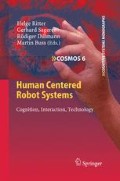Abstract
This work focuses on the detection of laughter in natural multiparty discourses. For the given task features of two different modalities are used from unobtrusive sources, namely a room microphone and a 360 degree camera. A relatively novel approach using Echo State Networks (ESN) is utilized to achieve the task at hand. Among others, a possible application is the online detection of laughter in human robot interaction in order to enable the robot to react appropriately in a timely fashion towards human communication, since laughter is an important communication utility.
Access this chapter
Tax calculation will be finalised at checkout
Purchases are for personal use only
Preview
Unable to display preview. Download preview PDF.
References
Campbell, N., Kashioka, H., Ohara, R.: No laughing matter. In: Proceedings of Interspeech, ISCA, pp. 465–468 (2005)
Campbell, W.N.: Tools and resources for visualising conversational-speech interaction. In: Proceedings of the Sixth International Language Resources and Evaluation (LREC 2008), ELRA, Marrakech, Morocco (2008)
Drullman, R., Festen, J., Plomp, R.: Effect of reducing slow temporal modulations on speech reception. Journal of the Acousic Society 95, 2670–2680 (1994)
Hermansky, H.: Auditory modeling in automatic recognition of speech. In: Proceedings of Keele Workshop (1996)
Hermansky, H.: The modulation spectrum in automatic recognition of speech. In: Proceedings of IEEE Workshop on Automatic Speech Recognition and Understanding, pp. 140–147. IEEE, Los Alamitos (1997)
Jaeger, H.: Tutorial on training recurrent neural networks, covering bppt, rtrl, ekf and the echo state network approach. Tech. Rep. 159, Fraunhofer-Gesellschaft, St. Augustin Germany (2002)
Jaeger, H., Haas, H.: Harnessing nonlinearity: Predicting chaotic systems and saving energy in wireless communication. Science 304, 78–80 (2004)
Kennedy, L., Ellis, D.: Laughter detection in meetings. In: Proceedings of NIST ICASSP, Meeting Recognition Workshop (2004)
Knox, M., Mirghafori, N.: Automatic laughter detection using neural networks. In: Proceedings of Interspeech 2007, ISCA, pp. 2973–2976 (2007)
Laskowski, K.: Modeling vocal interaction for text-independent detection of involvement hotspots in multi-party meetings. In: Proceedings of the 2nd IEEE/ISCA/ACL Workshop on Spoken Language Technology (SLT 2008), pp. 81–84 (2008)
Maganti, H.K., Scherer, S., Palm, G.: A novel feature for emotion recognition in voice based applications. In: Paiva, A.C.R., Prada, R., Picard, R.W. (eds.) ACII 2007. LNCS, vol. 4738, pp. 710–711. Springer, Heidelberg (2007)
Pugh, S.D.: Service with a smile: Emotional contagion in the service encounter. Academy of Management Journal 44, 1018–1027 (2001)
Scherer, S., Hofmann, H., Lampmann, M., Pfeil, M., Rhinow, S., Schwenker, F., Palm, G.: Emotion recognition from speech: Stress experiment. In: Proceedings of the Sixth International Language Resources and Evaluation (LREC 2008). European Language Resources Association (ELRA), Marrakech, Morocco (2008)
Scherer, S., Oubbati, M., Schwenker, F., Palm, G.: Real-time emotion recognition from speech using echo state networks. In: Prevost, L., Marinai, S., Schwenker, F. (eds.) ANNPR 2008. LNCS (LNAI), vol. 5064, pp. 205–216. Springer, Heidelberg (2008)
Strauss, P.M., Hoffmann, H., Scherer, S.: Evaluation and user acceptance of a dialogue system using wizard-of-oz recordings. In: 3rd IET International Conference on Intelligent Environments, IET, pp. 521–524 (2007)
Truong, K.P., Van Leeuwen, D.A.: Automatic detection of laughter. In: Proceedings of Interspeech, ISCA, pp. 485–488 (2005)
Truong, K.P., Van Leeuwen, D.A.: Evaluating laughter segmentation in meetings with acoustic and acoustic-phonetic features. In: Workshop on the Phonetics of Laughter, Saarbrücken, pp. 49–53 (2007)
Author information
Authors and Affiliations
Editor information
Editors and Affiliations
Rights and permissions
Copyright information
© 2009 Springer-Verlag Berlin Heidelberg
About this chapter
Cite this chapter
Scherer, S., Schwenker, F., Campbell, N., Palm, G. (2009). Multimodal Laughter Detection in Natural Discourses. In: Ritter, H., Sagerer, G., Dillmann, R., Buss, M. (eds) Human Centered Robot Systems. Cognitive Systems Monographs, vol 6. Springer, Berlin, Heidelberg. https://doi.org/10.1007/978-3-642-10403-9_12
Download citation
DOI: https://doi.org/10.1007/978-3-642-10403-9_12
Publisher Name: Springer, Berlin, Heidelberg
Print ISBN: 978-3-642-10402-2
Online ISBN: 978-3-642-10403-9
eBook Packages: EngineeringEngineering (R0)

